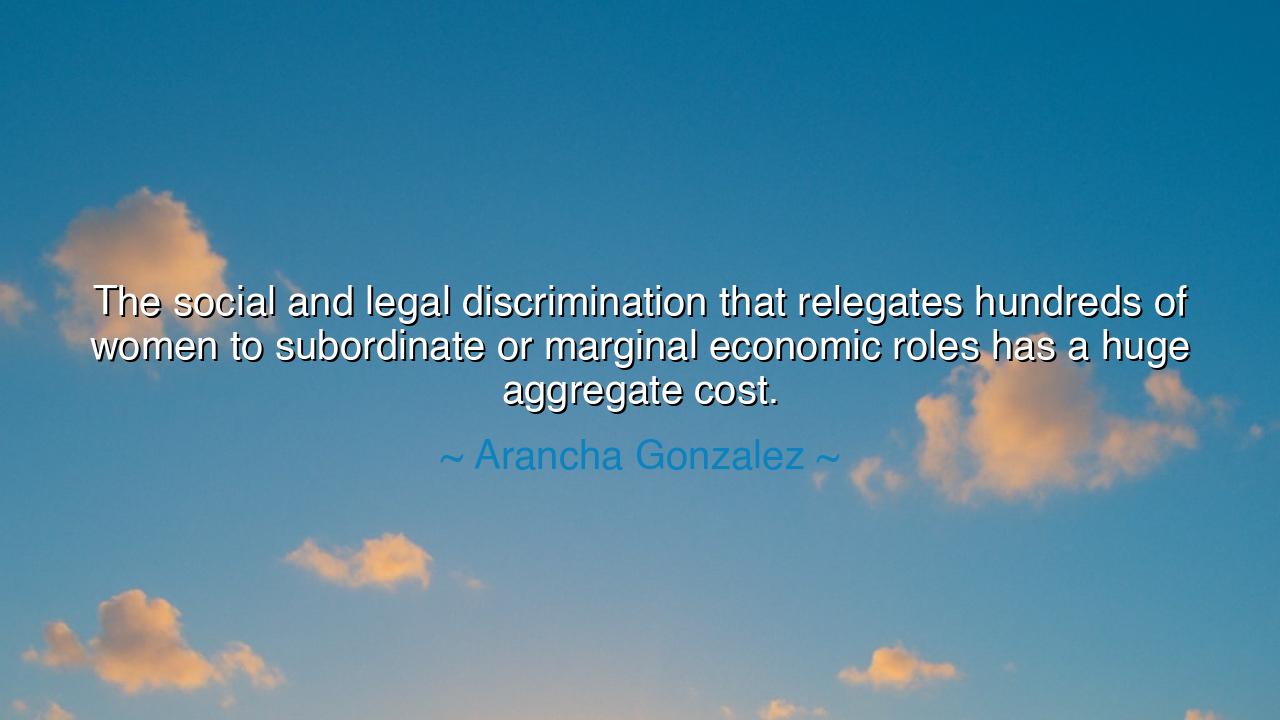
The social and legal discrimination that relegates hundreds of
The social and legal discrimination that relegates hundreds of women to subordinate or marginal economic roles has a huge aggregate cost.






The words of Arancha González resound like a warning bell for civilization itself: “The social and legal discrimination that relegates hundreds of women to subordinate or marginal economic roles has a huge aggregate cost.” In this single sentence, she reveals a truth that has echoed through millennia — that when injustice is written into the laws of men and sealed into the customs of society, its wounds do not remain confined to the oppressed alone. The pain of inequality spreads like a shadow across the entire realm, draining its vitality, its wisdom, and its potential. No nation can prosper when half of its people are shackled by silence.
In the style of the ancients, let us remember: every civilization that rose to greatness did so upon the shoulders of both men and women working in harmony. And every empire that crumbled did so when injustice became habit, when the powerful forgot that the strength of a society is measured not by how it treats its privileged, but by how it uplifts its least empowered. González’s words are not mere advocacy; they are prophecy. She speaks of economic roles, but beneath that lies the greater truth — that a people who deny the talents of women also deny their own future.
In ancient Athens, the cradle of democracy, women were barred from voting, from owning property, from speaking in assembly. The same society that produced philosophers and poets denied half its citizens the right to shape their destiny. Imagine, then, what wisdom was lost, what discoveries unborn, what progress delayed. The aggregate cost, as González calls it, is not counted merely in coins or ledgers; it is counted in lost inventions, silenced voices, and dreams turned to dust. For every woman kept in subordination, a thousand possibilities perish unseen.
History offers us luminous counterexamples — moments when courage shattered the chains of tradition. Consider the story of Emmeline Pankhurst and the suffragettes of Britain, who rose not with armies but with unyielding will. They marched, they starved, they suffered imprisonment — all to claim what should have been theirs by right: the equality of participation. Their victory did not merely free women; it strengthened the entire nation. For when women entered the workforce and the political sphere, the world itself began to change — science advanced, economies grew, and humanity’s vision widened. The emancipation of women was not a gift bestowed — it was an awakening achieved through struggle, and it made all people richer in spirit and in prosperity.
González, as a leader and diplomat, speaks from the wisdom of both economics and morality. She reminds us that discrimination is not only a sin of the heart — it is also a burden upon the world’s wealth. When laws restrict women from owning land, from starting businesses, or from receiving education, the productivity of entire nations falters. The aggregate cost she speaks of is immense: fewer innovations, smaller markets, slower growth. The chains of inequality drag upon progress itself, and even those who believe themselves powerful are secretly weakened by the weight of their own injustice.
This truth, though ancient, must be spoken again and again: no society can call itself advanced while it keeps its women in the shadows. The divine spark of creation — the genius that builds civilizations and heals the earth — is not confined by gender. It is a light born in every soul, waiting only for opportunity to shine. To relegate women to the margins is to dim half the light of humanity, and in that dimness, confusion and decay will surely follow.
Therefore, let this lesson be passed down as law for the ages: equality is not a favor, but a foundation. To lift women is to lift nations. To grant justice is to unleash abundance. The true measure of progress is not found in monuments or markets, but in how freely every citizen — man or woman — can rise according to their gifts.
So, to the leaders, teachers, and builders of tomorrow, hear these words: Tear down the barriers, both seen and unseen. Change not only the laws, but the hearts that still cling to ancient bias. Educate, empower, and include. For when you do, you will not only restore dignity to the many — you will restore greatness to the whole. And in that moment, the aggregate cost of discrimination will be transformed into the collective wealth of freedom, creativity, and shared destiny.






AAdministratorAdministrator
Welcome, honored guests. Please leave a comment, we will respond soon